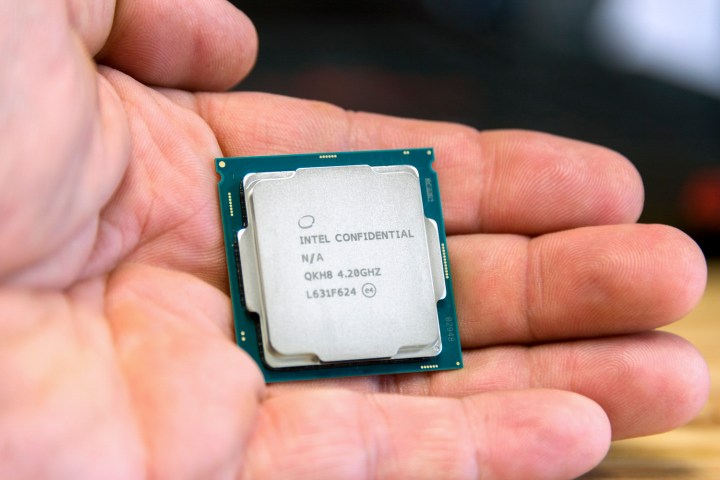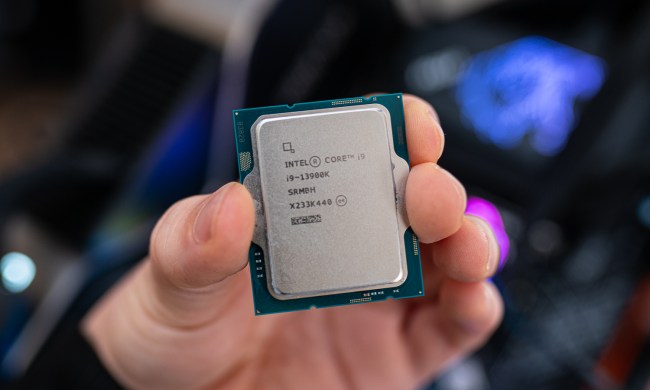
Intel’s “Anniversary Edition” Core i7-8086K CPU will go on sale June 8 as part of the company’s 40th-anniversary celebration of the 8086 chip, its first x86 design. The six-core processor will have a base clock of 4GHz, but when boosted will hit 5GHz. When put under extreme cooling, it can go even further.
The biggest change-up with Intel’s eighth-generation processors was in how they followed AMD’s Ryzen example (here’s how they compare) and increased the core count of the mainstream processors. Core i3 CPUs were bumped up to four cores and i5 and i7 chips to six cores. Clock speeds remained much closer to the previous generation’s, which is why the single-core 5GHz boost clock of the Intel Core i7-8086K is so intriguing. All cores will be capable of hitting 4.4GHz simultaneously when enabled.
This Anniversary Edition CPU will be the fastest hexacore CPU Intel has ever released to mainstream consumers and the first to reach 5GHz at “stock”. Created through binning (specifically selecting) 8700K CPUs, it will be 300MHz faster than the standard chip it’s based on and this doesn’t even factor in overclocking.
While the chips are expected to have similar overclocking potential as the best 8700K chips, top overclocker Der8auer put one of the new i7-8086K chips under liquid nitrogen to see what its capable of under extreme cooling. Before going down that road, he “delidded” the chip (though that’s not always worth it) and replaced its stock internal heatpaste for his own preferred liquid-metal alternative.
When supercooled down to extremely low temperatures (-185 degrees Celsius), Der8auer was able to achieve a maximum stable clock of 7,244MHz across all cores. That doesn’t break the 8700K world record of 7,409MHz as WCCFTech points out, but it’s not far off and suggests that the 8086 chips should be capable of decent overclocks beyond their already high clock-speeds when adequate cooling is available.
We first heard about the release date from Overclockers U.K.’s head of purchasing, Andrew Gibson, who stated in a (now deleted) forum post that the chips were slated to go up for pre-order on June 8. However, Intel has now made it official with the announcement of the June 8 launch date, as per TheVerge.
The company did not give us a price for the chip though. Gibson’s rumor post previously stated that the British retail price would be under 400 British pounds, which if you remove the 20-percent sales tax the U.K. employs, would work out to around $420. When U.S. sales taxes are involved that would make it close to $100 more than the existing 8700K, which might be a hard sell considering it’s only a few hundred megahertz faster out of the box. Existing 8700K owners or prospective buyers could simply get lucky with the capabilities of their new chip and find themselves with a CPU that’s just as capable as the Anniversary Edition Intel CPU.
If you’d rather get one for free, Intel is running a competition where it’s giving away 8,806 i7-8086K CPUs. The competition went live on June 7 and runs through June 8. The U.S. has an allocation of 2,086 of the stock, giving its residents the best chance of winning. Other regions and their allocations include 2,000 for China, 1,000 for Germany, and 500 each for Canada, France, the U.K., South Korea, Taiwan, and Japan.
All you need to do to enter is give Intel your email address and what qualifying region you reside in.
Updated on June 8, 2018 to include new overclocking results and updated competition details.


